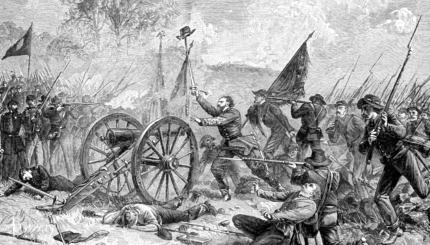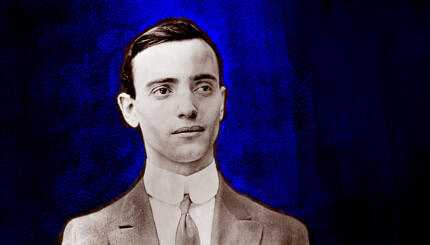Few things can easily pull a fasting person out of their annual Yom Kippur drowsiness. But this year, as guests at Beth Sholom Synagogue in Memphis, Tennessee, we were lucky enough to find one of those rare, attention-grabbing topics.
Still a little groggy, we filed into the sanctuary that afternoon and saw a healthy crowd of congregants—far more than we were expecting for the scheduled Yom Kippur symposium. Taking this as a good sign, we sat down and prepared to listen. We were there for a talk given by Dr. Aram Goudsouzian, the chair of the History Department at the University of Memphis. It was titled “Monuments and Mountaintops: Race, Politics, and Historical Memory in Memphis,” and clearly we were not the only ones intrigued by the subject matter.
Dr. Goudsouzian began his talk by discussing a local monument built to Nathan Bedford Forrest, a Confederate lieutenant general and early member of the Ku Klux Klan, in the early 1900s. In demonstrating the ways that historical figures’ legacies can shift over time, he set the stage to discuss Memphis’ civil rights history over the past century. As he traced the city’s leaders through time, he highlighted how Memphis’ peaceful and tolerant exterior had at times hidden inequality and hatred under the surface. He offered a concise and powerful history of the city, all the while connecting it to today’s discussion around monuments of Confederate figures. As non-Memphians, we found this history powerful and informative.
Beth Sholom Synagogue has a longstanding tradition of having a symposium before the Mincha service on Yom Kippur each year. On such an introspective holiday, the synagogue wants to include something educational and thought-provoking for its congregants between services. The Life Long Jewish Learning Committee chooses the topic each time, and throughout the years, the topics have ranged from Israel to the Syrian refugee crisis to forgiveness. Speakers have run the gamut: the mayor of Memphis and other politicians, community members and activists, thought leaders, and professors from local universities have all led sessions.
Rachel Shankman, who is not only the education chair of the Life Long Jewish Learning Committee but was also the founding director of Memphis’ Facing History and Ourselves office, explained how the synagogue wants congregants to see their place in the larger community and look outside of the Jewish sphere, even in the midst of Yom Kippur. Through looking at hard topics on a scholarly level, symposium attendees can explore Memphis’s rich history and ask critical questions to learn more about their community. While the conversations at the symposium are rich and meaningful, the synagogue doesn’t stop there. Often, the topics discussed at symposiums have led to further work about that issue. Throughout the years, congregants have started tikkun olam projects and raised money to support issues discussed at the symposiums.
As Jewish educators who aim to connect our programs to the world around us, we found this program deeply meaningful. Yom Kippur is about atoning — not just for the wrong we have done, but also for the wrong our community has done. Though we may not be Memphians, the idea of reckoning with your city’s history on this day of atonement is a powerful one. Ashamnu, the idea that we—not merely “I”—have transgressed, applies to our Jewish community as well as the other communities we are a part of. Beth Sholom’s symposium provides the knowledge to deepen this sense of communal responsibility, and the tikkun olam that it leads to is a way for congregants to act on it.
So, after the holidays… what actions are you contemplating taking in your communities? We would love to hear your ideas in the comments section below!
Mincha
Pronounced: MINN-khah, Origin: Hebrew, the afternoon prayer service. According to traditional interpretation of Jewish law, men are commanded to pray three times a day.



